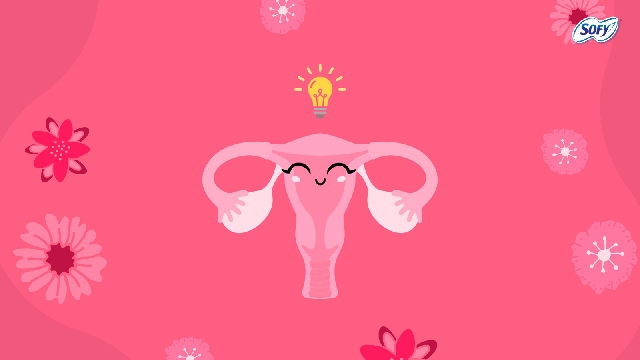Menstruation: The untold stories of women in the formal sector
 Some women go through a torrid time during their period
Some women go through a torrid time during their period
Hey there! Menstruation is a monthly shedding of the lining of a woman’s uterus (more commonly known as the womb).
This is an inevitable, uncompromising, non-negotiable natural situation exclusive to females.
I write these adjectives with grim facial expressions.
Women menstruate because it is an exclusive package embedded in their bodies by nature and this presents mixed feelings.
Thus, the joy of being able to procreate and the pain of menstrual conditions.
What is the translation of the word ‘menstruation’ in your local dialect?
In Gurene (Frafra) it is called ‘Peere’ when transliterated means ‘Cleansing’ and the Ga word is ‘Tsuɛ sɛɛ ya’ when transliterated means ‘Going behind the building’.
We will discuss the meaning behind the local words and expressions for menstruation at another time.
Predominantly, a sanitary pad is the first proposed solution to the monthly flow, while there is little attention to the conditions arising from the situation.
The priorities may vary among females on issues about access to menstrual accessories.
Conditions arising from menstruation include menstrual cramps, diarrhoea, convulsions, nausea, headache, stomach ache, mood swings, etc.
All these happen monthly, and their reoccurrence and intensity vary with each female body.
This article seeks to ignite the conversation on the menstrual period and amplify the stories of menstrual conditions among women working in the formal sector.
On my WhatsApp status, I posed the question;
‘Can you inform your employer about your menstrual period, therefore you can’t work effectively?’
This led to a series of conversations with different people and this is captured in respect to their privacy; pseudo-names have been used.
1. CONVERSATION WITH A SCIENTIST
Abugre: Can you inform your employer about your menstrual period, therefore you can’t work effectively?
Lady Scientist: Hmm
Abugre: What do you have to say about the question?
Lady Scientist: I don’t tell him, but my boss understands.
There was a day he came to meet me, almost in tears.
He asked what was wrong. I explained to him, and he just asked me to go home.
He asked if it’s always been like that.
Since then, I don’t bother to go to the laboratory.
I just text him that I’m not well, and he understands.
I once did an attachment in a hospital and had to go back home because of the pain.
The next day, I called and told my supervisor I couldn’t come because of the same reason.
She knew of my condition because she was around the previous day when I was enduring unbearable pain. She hung up on me before I explained myself.
The next day, she expressed her displeasure, asking me to get a doctor’s report when I want to stay away. Apparently, she wasn’t even happy the day I had to go home in so much pain.
She was a lady, she should have been more understanding.
I was not a staff, just an intern.
My current boss is a male and has employed me full time.
When we say women are our own enemies, it’s from such experiences.
Very painful. Who should have been more understanding?
Abugre: I am very surprised about this.
I thought a woman would understand and provide the support needed.
Lady Scientist: Hmmm, I was never happy working there again until I left.
Abugre: That’s very unfortunate
Lady Scientist: Very, very unfortunate
Abugre: What do you think should be done at workplaces to accommodate you during these times?
Lady Scientist: The pain for some of us is excruciating, you can’t walk.
You can only roll and shout. In such cases, a day or two off is fine.
We could work on weekends or overtime later to cover up the remaining hours.
To those who can manage to be at the workplace, at least a restroom should be available where we can lie down ‘small’.
This might be enough for us.
Understanding is very crucial. Funny enough, our own fellow women say “you are not sick, brace yourself. This is a natural occurrence.
It happens to all of us, etc.” But trust me, the pain is relative to every woman.
Some go about without feeling anything. When I was in SHS, a few of my mates had very severe episodes, and I never understood them until mine started after I recovered from a kidney failure.
So mine is secondary, i.e. as a result of something.
But some people’s own is primary, that’s how it has always been.
Around this time, you are losing blood. You get anaemic, dizzy, lose appetite, easily get tired, and it gets very difficult to focus on work.
So they should understand us and give us some allowance to be ‘lazy’.
Getting out of your home to work is even a herculean task before you then have to focus and complete your work schedule.
So to the other women, especially the older ones, the fact that they don’t go through that much pain, doesn’t mean it is the same for everyone.
Some people faint, some vomit, some have to be admitted to the hospital; others have to be injected. We are all not the same.
They should learn to stop those comments and help their own.
Abugre: This means that other women amplify the thought that there’s nothing wrong with you.
Do you think this makes other men become ‘inconsiderate’?
Lady Scientist: Yeah, they do. I think men who have daughters or wives going through similar experiences will be understanding.
With what my own dad saw at home, he will definitely understand when he meets another woman going through that.
Those, who have no idea and would listen to other women’s opinions, can be easily misled and become inconsiderate.
Abugre: Hm. Can we have these conversations in churches where these men can be informed?
Lady Scientist: Sure. It depends on the church.
Not in my church. They don’t have respect for women there.
Hmmm, one of the things that get me fired up. In our church, women are always objects of temptation; they don’t have to assume authority over men, no matter their age or knowledge, and these are all fallacies.
2. CONVERSATION WITH A JOURNALIST
Abugre: Can you inform your employer about your menstrual period so you can’t work effectively?
Lady Journalist: Wow. The workplace is brutal. Not every boss may understand, even for some who are women
Abugre: Hmm, do you speak to your HR about menstrual conditions?
Lady Journalist: Well, luckily for me, I haven’t had a situation where I have to speak to HR.
Since I began work in October, my period pains have been on weekends or holidays.
But during my national service, I only once told my female supervisor.
She understood perfectly and made me take the day off.
But for the rest of the time, I called in sick.
Abugre: This is better
Lady Journalist: Lol, why did somebody tell HR she couldn’t work effectively because of that?
Abugre: No others get stigmatized and are being tagged as lazy.
Lady Journalist: That’s sad. I remember when I used to take those days off during National service; my sisters would say I should muster courage and go to work despite the pain.
That I can’t always take the day off.
But with all honesty, they knew it would be really hard and very uncomfortable to work suffering all that pain.
3. CONVERSATION WITH A PROJECT OFFICER
Abugre: Can you inform your employer about your menstrual period so you can’t work effectively?
Lady Project Officer: Will the employer understand?
Abugre: Hmm. What will cause the employer not to understand?
Lady Project Officer: Most people don’t understand the multifaceted nature of Menstrual Hygiene Management. That’s where the problem begins.
4. CONVERSATION WITH AN ACTIVIST
Abugre: Can you inform your employer about your menstrual period so you can’t work effectively?
Lady Activist: I used to do that and get told I’m a woman and that the pain is something I can easily suck up.
Abugre: What do you think fuels such perception?
Lady Activist: You’ll have to ask the men that say it to me.
One woman I worked with was surprised I get cramps.
With my condition, it disables me temporarily.
Abugre: Why would they think that way?
Lady Activist: I don’t know, but it is a big issue.
Abugre: Do you think other women amplify these thoughts?
Lady Activist: Some women amplify these thoughts, probably those who do not experience it and are in the workplace.
Abugre: That’s true.
Lady Activist: Yes, and they paint this image that it’s a lie the level of pain we experience.
Abugre: Ah
Lady Activist: True
Abugre: Should we attribute this to ignorance or people just being non-conforming?
Lady Activist: It’s so offensive because the pain is all I’ve known, so it was weird learning that some people don’t experience it.
But I never judged that it was set in stone because each person is different.
My pain is different from my friend’s. She spends 4 days in the hospital each month because the cramps cripple her. The doctor had to give her a report before her boss understood.
Abugre: Geez, hmm. Do you get the chance to talk about these with your bosses?
Lady Activist: Lol, they don’t listen.
I simply just do what I want. It was recently I got a boss whose wife had a similar case, so he understood what I was going through.
5. CONVERSATION WITH A DEVELOPMENT OFFICER
Abugre: Can you inform your employer about your menstrual period so you can’t work effectively?
Lady Development Officer: This matter!
Abugre: Hmm, I have been wondering how you guys do it.
Lady Development Officer: It is not easy oo. Some bosses don’t even care at all, like, are you the only lady who goes through that?
Abugre: Are these male bosses or female bosses?
Lady Development Officer: Both… Ladies are sometimes considerate depending on your relationship with them.
Abugre: Do you freely talk about menstrual stuff at the workplace?
Lady Development Officer: Why not, it’s part of our daily lives… Even though others don’t feel okay talking about it.
Abugre: What will you need at the workplace to support you?
Lady Development Officer: The only thing is bosses understand the fact that sometimes menstruation can be extremely painful and when it happens, we should be given the needed support being it an off day or just a couple of hours to heal.
Abugre: Do you feel comfortable tagging it as a sickness therefore you are allowed to go home? Or probably there should be a room dedicated to women to heal during that time.
Lady Development Officer: Of course, sometimes you have to lay on your stomach to feel better, so if there’s a possibility. If only it would be considered.
Abugre: Why don’t you make a recommendation at the end of the staff meeting?
Lady Development Officer: I’m not sure there will be room for that.
Abugre: But a space for you to be alone is needed, right?
Lady Development Officer: Of course.
Proposed Solutions
In a conversation with an attorney at a state institution and friends, the following were proposed;
Every worker is entitled to sick leave therefore, in your lowest form, do not hesitate to inform your employer about being unwell. There should be sexual reproductive health education to correct misconceptions about the female body. The workplace should have a room for recuperating as some women need to rest for a while and continue their work. Female workers are encouraged to work hard to recover their lost periods.
Source: Daniel Anyorigya
Trending Entertainment

Akwaboah lashes out at critics, explains controversial wedding anniversary photo
13:00
Akwaboah didn't cut off 'five-year locks' over personal branding
12:17
AdinkraFest Set For July 24, 26
11:34
‘Once, I snatched corn from chicken’: Kwaisey Pee reveals how father ‘not staying at one place’ hurt his childhood
00:53
Tokunbo Ibrahim: West African TikTok exec discusses educational content with Communication Minister
00:12
Bridget Otoo: Journalist appointed Presidential Staffer, Government Communications
23:44
Rose Adjei – Secular artistes don’t ‘necessarily’ need to repent and become Gospel singers
01:17
Denis Villeneuve: Hollywood heavyweight picked as next James Bond film director
00:02
Singer Jessie J undergoes surgery for breast cancer
20:38
Ghana launches PANAFEST & Emancipation 2025
07:44




